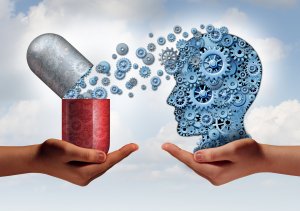People usually consider detoxification as the primary barrier to drug and alcohol de-addiction since it removes addictive substances from the body. Detox is quite essential, yet it fails to cover the profound healing challenges that lie ahead. Detoxification fails to fix addiction to substances or habits because substance abuse and habit addiction typically develop from emotional issues, psychological problems, and social conditions.
For complete recovery, one needs an extensive method that supports overall wellness by simultaneously developing the physical body, mental health, and spiritual condition. After detox, medical attention switches to rebuilding emotional strength while helping individuals recover mental clarity to create a sustainable, healthier balance in life.
Why Detoxification Alone Is Not Enough
The goal of detoxification methods is to treat the bodily dependence on addictive substances. The stabilisation process through detoxification controls withdrawal symptoms while protecting physical health from dangerous consequences like disruptions and rage, as well as hallucinations. After a person recovers from physical addiction symptoms, they face major psychological and emotional aspects of their addiction that stay unchanged.
Challenges remain high for individuals who do not receive psychological treatment following detoxification because research shows high rates of relapse. Detox leaves behind critical elements that people need because it fails to provide coping methods and emotional healing, and ignores environmental factors and psychological stressors, which keep addictive behaviours alive.
Detox removes toxins from the body, yet it does not teach mental transformation or life rebuilding.
A Holistic Model for De-Addiction
When people receive holistic de-addiction treatment, professionals target the person operating at every level for successful recovery. Multiple health interventions merge medical treatments with psychological support, lifestyle adjustments, and social networks to create sustainable healing.
Some core elements of holistic de-addiction include:
1. Comprehensive Assessment and Personalised Treatment Plans
A precise evaluation starts the recovery process. A complete examination evaluates physical wellness, historical mental health records, life patterns, emotional stability, and social relationships.
The full assessment helps healthcare providers create individualised, evidence-based treatment guides for people in recovery. Because addiction processes differ between individuals, each person needs a unique recovery approach.
2. Integration of Psychological Therapies
Psychological healing is often at the heart of long-term recovery. Addressing trauma, anxiety, depression, and other underlying conditions is essential to prevent relapse and promote emotional strength.
Therapeutic interventions commonly include:
- Individual therapy to explore personal challenges, develop coping mechanisms, and set recovery goals
- Group therapy to create a sense of belonging and shared learning
- Family therapy to rebuild trust, communication, and support systems within families
- Healing relationships, managing emotions, and reshaping thought patterns are vital to a sustained recovery.
3. Emphasis on Physical Rehabilitation
Mental health is closely linked with physical health in an individual system. Body strength achieved through fitness therapy with physiotherapy and structured exercise programs provides dual benefits, including better endurance capabilities, improved mood management, and emotional strength.
Fitness therapy, under professional guidance, can:
- Improve sleep quality
- Boost energy levels
- Stimulate the release of endorphins, the body’s natural mood enhancers
Regular physical activity creates a positive feedback loop that supports emotional and psychological wellbeing.
4. Alternative Healing Avenues
Beyond traditional therapy, many individuals benefit from complementary therapies that nurture creativity, mindfulness, and self-expression.
Some notable examples include:
- Yoga therapy, which helps regulate stress responses, promote mindfulness, and foster inner calm
- Art-based therapy provides a non-verbal outlet for emotions that may be difficult to articulate through words
- Relaxation therapies like breathing exercises and progressive muscle relaxation promote mental clarity and emotional grounding.
These therapies enrich the recovery experience, offering new ways to process emotions and cultivate inner peace.
5. Specialised Programs for Habit-Based Addictions
Addictions today are not limited to substances. Behaviours like mobile overuse, internet gaming, gambling, pornography consumption, and even compulsive shopping can also cause significant emotional and social harm.
Holistic centres now recognise the growing need for specialised programs that target:
- Biological components (such as reward system dysregulation in the brain)
- Psychological patterns (such as emotional regulation and impulse control issues)
- Through a combination of pharmacotherapy, brain stimulation treatments, and structured psychotherapy, individuals can break free from harmful behavioural cycles and learn healthier coping mechanisms.
The Importance of Evidence-Based Care
Holistic de-addiction is most effective when it is rooted in scientific evidence. Centres governed by strong clinical frameworks, such as those under Fortis Healthcare standards, ensure that every medical, psychological, or therapeutic intervention is guided by research and best practices.
Evidence-based care ensures:
High Safety Standards
Evidence-based care means treatments are carefully tested to be safe. Doctors and therapists follow methods that have been studied and approved, reducing risks. For someone starting recovery, this ensures they’re in a secure environment where their health comes first.
Personalised and Responsive Treatment
No two people are the same, and evidence-based care reflects that. Using research, clinicians create plans tailored to each person’s needs, like adjusting therapy for specific triggers. If something isn’t working, the plan can shift quickly to keep progress on track.
Continuous Monitoring and Adjustments Based on Outcomes
Recovery isn’t a straight line, so evidence-based care involves constant check-ins. Therapists and doctors track how someone’s doing and tweak treatments based on what’s working. This keeps the journey moving forward, adapting to challenges along the way.
The Bottom Line
The recovery process extends past drug detox because it teaches patients to reestablish their lives by developing a commitment to meaningful goals while developing the strength to beat challenges and regaining optimism about the future. Complete wellness strategies that address emotional care and bodily health alongside psychological assistance enable people to find themselves completely independent from their pain points.
For those seeking expert, evidence-based, and compassionate care, Sukoon Health delivers specific de-addiction recovery programs through experts who combine evidence-based practices with complete patient wellness approaches. Sukoon Health enables individuals to start their wellness journey through their complete recovery model that links a multidisciplinary staff with comprehensive recovery methods.
To know more or to take the first step towards recovery, reach out to Sukoon Health today.





